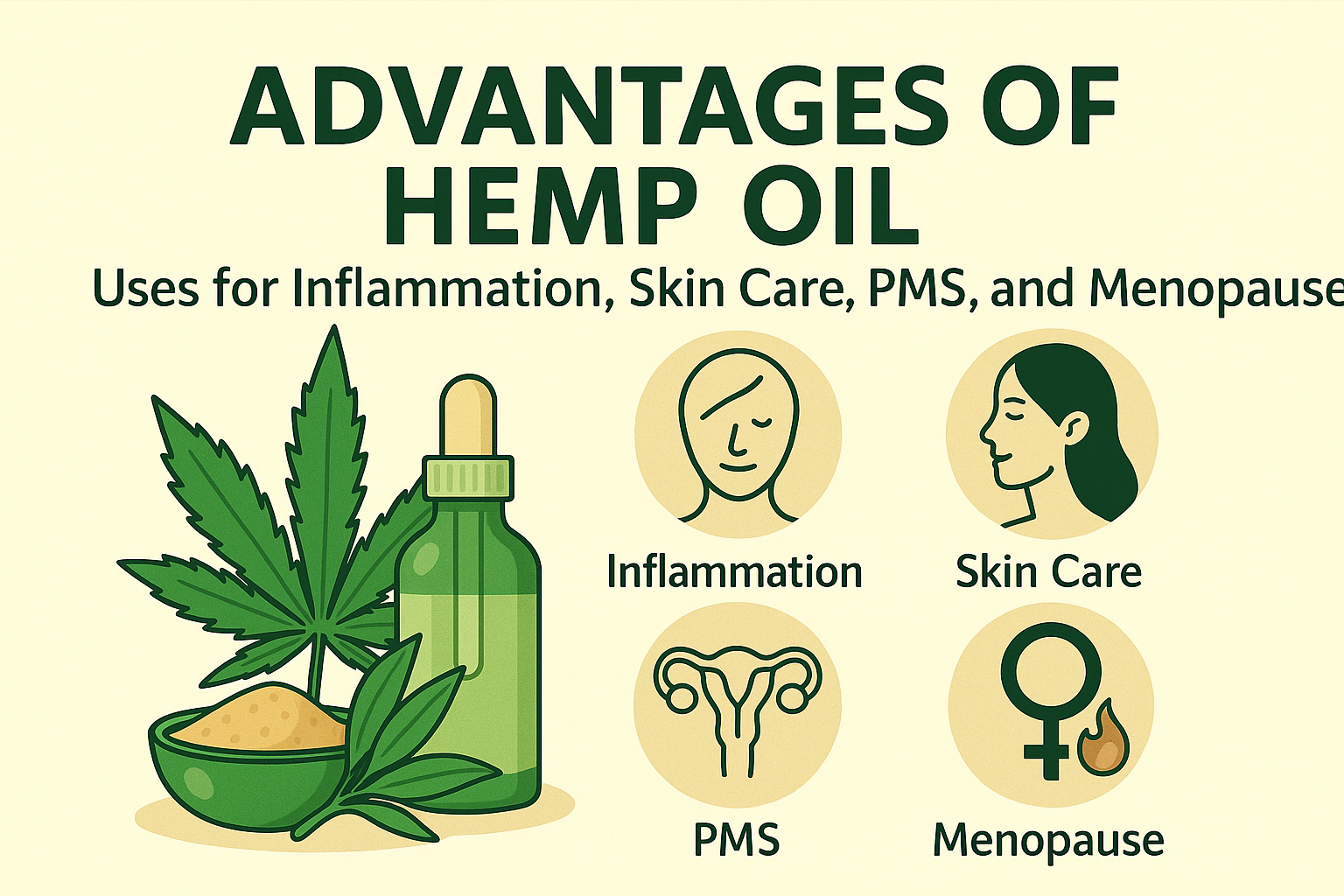
Blog
Advantages of Hemp Oil: Uses for Inflammation, Skin Care, PMS, and Menopause

Table of Contents
- What Is Hemp Oil and What Does It Contain
- How Hemp Oil Helps Reduce Inflammation
- Using Hemp Oil for Acne, Eczema, and Psoriasis
- Hemp Oil’s Role in Managing PMS Symptoms
- Benefits of Hemp Oil During Menopause
- Additional Health Benefits of Hemp Oil
- Frequently Asked Questions
Hemp oil, extracted from cold-pressed hemp seeds, is rich in essential fatty acids like omega-3 and omega-6 in a balanced ratio, plus nutrients such as gamma linolenic acid (GLA). These components offer anti-inflammatory benefits that may help reduce pain and swelling when applied topically or taken orally. For skin care, hemp oil’s fatty acids assist in managing acne, eczema, psoriasis, and other inflammatory conditions by moisturizing the skin and reducing bacteria. Women experiencing PMS might find relief due to GLA’s role in hormone regulation. Additionally, hemp oil may ease menopause symptoms by supporting hormone balance and lowering inflammation. Overall, it’s a natural option worth considering under medical advice.
What Is Hemp Oil and What Does It Contain

Hemp oil is made by cold-pressing the seeds of industrial hemp plants, a process that avoids heat to keep its nutrients intact. It is packed with essential polyunsaturated fatty acids, mainly omega-3 and omega-6, in a balanced 3:1 ratio that supports overall health. A key component is gamma linolenic acid (GLA), an omega-6 fatty acid known for its anti-inflammatory benefits. Beyond fatty acids, hemp oil carries vitamins like vitamin E, minerals such as magnesium and potassium, and amino acids that play important roles in skin and body health. Its antioxidants help guard cells against damage from free radicals, which are linked to aging and disease. Unlike CBD oil, hemp oil contains little to no cannabidiol and almost no THC, so it won’t produce any psychoactive effects. With its light, nutty flavor, hemp oil is often used in cooking or taken as a supplement. It offers a versatile fatty acid profile that supports heart and skin health and can be applied topically or consumed orally, making it a flexible option for various wellness needs.
- Hemp oil is extracted by cold-pressing seeds of industrial hemp plants, avoiding heat to preserve nutrients.
- It is rich in essential polyunsaturated fatty acids, mainly omega-3 and omega-6, in an ideal 3:1 ratio for health benefits.
- Contains gamma linolenic acid (GLA), an omega-6 fatty acid known for anti-inflammatory effects.
- Includes vitamins such as vitamin E, minerals like magnesium and potassium, and amino acids important for skin and body health.
- Contains antioxidants that help protect cells from damage by free radicals.
- Hemp oil is non-psychoactive, having almost no THC, so it does not produce a high.
- The oil has a light, nutty flavor and is often used in cooking or as a supplement.
- It has a balanced fatty acid profile beneficial for cardiovascular and skin health.
- Hemp oil differs from CBD oil; it contains little or no cannabidiol but is valued for its nutrients.
- It can be used both topically and orally, offering flexibility in how it supports health.
How Hemp Oil Helps Reduce Inflammation
Hemp oil is known for its ability to reduce inflammation, largely thanks to its rich content of omega-3 fatty acids. These fatty acids help lower inflammation linked to chronic diseases like heart disease and cancer by improving cell membrane function and regulating inflammatory signals. One key component, gamma linolenic acid (GLA), is a powerful anti-inflammatory compound that helps reduce swelling and pain. Hemp oil also supports the body’s production of anti-inflammatory prostaglandins, especially prostaglandin E1 (PGE1), which plays a role in calming the immune response. Regular intake of hemp oil can aid in managing autoimmune and inflammatory conditions by modulating immune activity. Beyond ingestion, applying hemp oil topically may soothe inflamed skin and decrease redness, providing relief from irritation. Its antioxidant properties further contribute by neutralizing free radicals that drive inflammation. Studies have shown that omega-3 supplements, including hemp oil, reduce markers of inflammation in the blood. When combined with other anti-inflammatory foods, hemp oil’s effects can be even more pronounced. Overall, hemp oil offers a natural, gentle option for supporting inflammation management without the harsh side effects often seen with pharmaceutical treatments.
Using Hemp Oil for Acne, Eczema, and Psoriasis
Hemp oil is a useful natural option for managing common skin conditions like acne, eczema, and psoriasis due to its rich fatty acid content and bioactive compounds. For acne-prone skin, the oil’s fatty acids help balance sebum production, reducing excess oil that often leads to flare-ups. The cannabidiol (CBD) in hemp oil also provides anti-inflammatory and sebostatic effects, calming irritated skin and limiting breakouts. When it comes to eczema, dietary hemp oil supports skin barrier repair and reduces dryness, while topical application deeply moisturizes the skin to prevent moisture loss. This helps soothe itching and redness typical of eczema. Psoriasis symptoms benefit from the omega-3 fatty acids in hemp oil, which reduce inflammation in the plaques. Combining hemp oil supplementation with omega-3s, vitamin D, and UVB phototherapy has been shown to improve treatment outcomes. Additionally, hemp oil’s antibacterial properties help inhibit bacteria such as Staphylococcus aureus, which can worsen skin infections. By providing essential nutrients for cell repair, hemp oil supports skin healing and strengthens resilience against viral, bacterial, and fungal infections. Regular use may lead to noticeable reductions in itching, redness, and scaling associated with these conditions, making hemp oil a valuable part of a skin care routine for inflammatory skin disorders.
<<Balances sebum production and reduces excess oil; cannabidiol provides anti-inflammatory and sebostatic effects<2014 study: cannabidiol from hemp oil is a potent anti-acne agent<<Improves symptoms by restoring skin barrier and reducing dryness; deeply moisturizes to prevent moisture loss<2005 trial showed dietary hemp oil improved eczema symptoms over 20 weeks<<Omega-3 fatty acids reduce inflammation; supports treatment outcomes when combined with vitamin D and UVB therapy; moisturizes and soothes plaques<2015 study supports omega-3 supplementation with hemp oil in managing psoriasis<<Has antibacterial properties inhibiting bacteria like Staphylococcus aureus; supports skin healing and resilience against infections<Hemp oil’s antibacterial effect helps prevent common skin infections<<Deeply moisturizes; strengthens skin resilience; reduces itching, redness, and scaling in affected skin conditions<Topical hemp oil is easily absorbed and prevents moisture loss
| Skin Condition | Hemp Oil Benefits | Supporting Research/Notes |
|---|---|---|
| Acne | ||
| Eczema | ||
| Psoriasis | ||
| Skin Infection Resistance | ||
| Moisturization and Skin Health |
Hemp Oil’s Role in Managing PMS Symptoms
PMS symptoms often stem from imbalances in inflammation and hormone regulation, with low levels of prostaglandin E1 (PGE1) playing a key role. Hemp oil is rich in gamma linolenic acid (GLA), a fatty acid that serves as a precursor to PGE1, helping to restore this balance. Clinical trials have shown that women who take supplements containing GLA, like those found in hemp oil, report fewer mood swings, reduced cramps, and less breast tenderness. This is because hemp oil supports hormone receptor function by maintaining healthy cell membranes, which can lower sensitivity to hormonal fluctuations. Its anti-inflammatory properties also ease physical discomfort, while nutrients in hemp oil help maintain nervous system health, reducing irritability and anxiety often linked to PMS. Regular intake of hemp oil, whether as a supplement or added to meals, encourages healthy prostaglandin production, which plays a role in regulating the menstrual cycle. For many, hemp oil provides a natural alternative to pharmaceutical options, offering gentle symptom relief with the added benefits of supporting overall hormone and nervous system wellness.
Benefits of Hemp Oil During Menopause
Hemp oil offers several benefits for managing menopause symptoms, largely due to its rich content of gamma linolenic acid (GLA) and essential fatty acids. Animal studies suggest it may help protect against common menopause complications such as hormonal imbalance and inflammation. GLA plays a key role in supporting hormone regulation, which is important during this transition. Many menopausal symptoms, like hot flashes, may be eased by hemp oil through improved blood flow and its ability to reduce inflammatory responses. Mood swings and anxiety, often linked to menopause, may also improve with regular intake of hemp oil’s fatty acids, which support brain and emotional health. On the skin side, hemp oil helps maintain moisture and elasticity, countering dryness and thinning that commonly occur during menopause. Its antioxidants protect cells from oxidative stress, which tends to increase during this time. Additionally, the fatty acids in hemp oil support cardiovascular health, addressing the higher risk of heart disease after menopause. Hemp oil may also contribute to bone health indirectly by reducing inflammation and aiding nutrient absorption. Overall, regular use of hemp oil can support a balanced approach to managing both physical and emotional menopausal symptoms, offering a gentle, natural option without relying on hormonal drugs.
Additional Health Benefits of Hemp Oil
Hemp oil offers several health benefits beyond inflammation, skin care, PMS, and menopause. Its natural antibacterial properties help prevent infections by stopping harmful bacteria from growing on the skin and within the body. Rich in antioxidants, hemp oil protects cells from damage linked to aging and chronic diseases, supporting overall longevity. It also promotes heart health by helping to improve cholesterol levels and regulate blood pressure, which lowers the risk of cardiovascular problems. The nutrients in hemp oil support brain health and cognitive function by reducing inflammation and oxidative stress. Additionally, hemp oil aids digestion and gut health by strengthening the intestinal lining and calming inflammation, which can improve nutrient absorption and comfort. For hair care, hemp oil nourishes the scalp and hair follicles, reducing dryness and breakage to encourage stronger, healthier hair. When used as directed, hemp oil is safe for both topical and oral use, with few reported side effects. Its nutrient profile may also support the immune system, enhancing the body’s defense mechanisms. Importantly, hemp oil does not cause any psychoactive effects since it contains almost no THC, distinguishing it from marijuana. However, it’s wise to consult a healthcare professional before combining hemp oil with medications to avoid potential interactions.
Frequently Asked Questions
1. How does hemp oil help reduce inflammation in the body?
Hemp oil contains omega-3 and omega-6 fatty acids that have anti-inflammatory properties. These nutrients can help balance the body’s inflammatory responses, potentially reducing pain and swelling in chronic conditions or general inflammation.
2. What are the benefits of using hemp oil for skin care?
Hemp oil is rich in antioxidants and essential fatty acids that can nourish the skin, improve hydration, and soothe irritation. It may help with conditions like dry skin, acne, and redness by supporting the skin’s natural barrier and reducing inflammation.
3. Can hemp oil provide relief from PMS symptoms, and if so, how?
Hemp oil may ease PMS symptoms thanks to its fatty acids that support hormone regulation and reduce inflammation. Some users report improvements in mood swings, cramps, and bloating, although more research is needed for conclusive evidence.
4. Is hemp oil effective for managing menopause-related discomfort?
Some studies suggest hemp oil might help with menopause symptoms like hot flashes and mood changes due to its influence on the endocannabinoid system, which plays a role in hormone balance and stress regulation. However, individual results can vary.
5. Are there any risks or side effects of using hemp oil for inflammation or hormonal support?
Hemp oil is generally considered safe for most people, but some may experience mild side effects like digestive upset or allergic reactions. It can also interact with certain medications, so checking with a healthcare provider before use is recommended, especially for hormonal or inflammation-related treatments.
